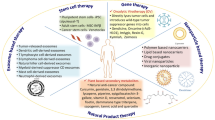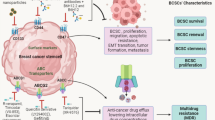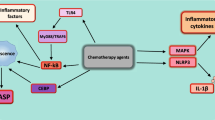Abstract
To give an overview of contemporary experimental research using Chinese medicine (CM) for the treatment of cancer. As an integral part of mainstream medicine in the People’s Republic of China, CM emphasizes improvements in holistic physical condition instead of merely killing tumor cells, which is consistent with the current medical model that advocates patient-oriented treatment. Great progress has been made in experimental research, and the principle aspects include anti-tumor angiogenesis, inducing apoptosis and differentiation, reversing multidrug resistance, and improving immune function. As a current hot topic in cancer research, tumor microenvironment (TME) highlights the mutual and interdependent interaction between tumor cells and their surrounding tissues, and the CM treatment concept bears a striking resemblance to it. To date, primary points of TME include extracellular matrix remodeling, inflfl ammation, hypoxia, and angiogenesis, but trials using CM with a focus on TME are rare. Despite considerable recent development, experimental research on CM for solving cancer issues appears insufficient. Greater efforts in this field are urgently needed.
Similar content being viewed by others
References
Siegel R, Naishadham D, Jemal A. Cancer statistics, 2013. CA Cancer J Clin 2013;63:11–30.
Jain RK. Normalizing tumor microenvironment to treat cancer: bench to bedside to biomarkers. J Clin Oncol 2013;31:2205–2218.
Bell RM. A review of complementary and alternative medicine practices among cancer survivors. Clin J Oncol Nurs 2010;14:365–370.
Posadzki P, Watson LK, Alotaibi A, Ernst E. Prevalence of use of complementary and alternative medicine (CAM) by patients/consumers in the UK: systematic review of surveys. Clin Med 2013;13:126–131.
Li-Weber M. Targeting apoptosis pathways in cancer by Chinese medicine. Cancer Lett 2013;332:304–312.
Wang X, Zhang N, Huo Q, Yang Q. Anti-angiogenic and antitumor activities of Huaier aqueous extract. Oncol Rep 2012;28:1167–1175.
Zhong ZF, Hoi PM, Wu GS, Xu ZT, Tan W, Chen XP, et al. Anti-angiogenic effect of furanodiene on HUVECs in vitro and on zebrafish in vivo. J Ethnopharmacol 2012;141:721–727.
Yang L, Wei DD, Chen Z, Wang JS, Kong LY. Reversal effects of traditional Chinese herbs on multidrug resistance in cancer cells. Nat Prod Res 2011;25:1885–1889.
Reid-Adam J, Yang N, Song Y, Cravedi P, Li XM, Heeger P. Immunosuppressive effects of the traditional Chinese herb Qu Mai on human alloreactive T cells. Am J Transplant 2013;13:1159–1167.
Welti J, Loges S, Dimmeler S, Carmeliet P. Recent molecular discoveries in angiogenesis and antiangiogenic therapies in cancer. J Clin Invest 2013;123:3190–3200.
Zhang L, Ji Q, Liu X, Chen X, Chen Z, Qiu Y, et al. Norcantharidin inhibits tumor angiogenesis via blocking VEGFR2/MEK/ERK signaling pathways. Cancer Sci 2013;104:604–610.
Yu X, Tong Y, Kwok HF, Sze SC, Zhong L, Lau CB, et al. Anti-angiogenic activity of Erxian Decoction, a traditional Chinese herbal formula, in zebrafish. Biol Pharm Bull 2012;35:2119–2127.
Yu X, Tong Y, Huang W, Ge W. Erxian decoction, a traditional chinese herbal formula, inhibits angiogenesis in human umbilical vein endothelial cells. Biol Pharm Bull 2013;36:754–763.
Xu X, Wang S, Chen W, Chen G. Effects of taohong siwu decoction in the chick chorioallantoic membrane (CAM) assay and on B16 melanoma in mice and endothelial cells ECV304 proliferation. J Tradit Chin Med (Chin) 2006;26:63–67.
Ouyang L, Shi Z, Zhao S, Wang FT, Zhou TT, Liu B, et al. Programmed cell death pathways in cancer: a review of apoptosis, autophagy and programmed necrosis. Cell Prolif 2012;45:487–98.
Ryoo HD, Bergmann A. The role of apoptosis-induced proliferation for regeneration and cancer. Cold Spring Harb Perspect Biol 2012;4:a008797.
Zhang DM, Liu JS, Deng LJ, Chen MF, Yiu A, Cao HH, et al. Arenobufagin, a natural bufadienolide from toad venom, induces apoptosis and autophagy in human hepatocellular carcinoma cells through inhibition of PI3K/Akt/mTOR pathway. Carcinogenesis 2013;34:1331–1342.
Li D, Xu X, Qian R, Geng J, Zhang Y, Xie X, et al. Effect of Lichong decoction on expression of Bcl-2 and Bcl-2- associated X protein mRNAs in hysteromyoma model rat. J Tradit Chin Med (Chin) 2013;33:238–242.
Deng S, Hu B, An HM, Du Q, Xu L, Shen KP, et al. Teng-Long-Bu-Zhong-Tang, a Chinese herbal formula, enhances anticancer effects of 5-fl uorouracil in CT26 colon carcinoma. BMC Complement Altern Med 2013;13:128.
Lin C, Tsai SC, Tseng MT, Peng SF, Kuo SC, Lin MW, et al. AKT serine/threonine protein kinase modulates baicalintriggered autophagy in human bladder cancer T24 cells. Int J Oncol 2013;42:993–1000.
Lai N, Huang XS, Chen JL, Qin YH, Zeng YQ, Hu YL, et al. Experimental study on the differentiation effect of SMMC-7721 cells induced by Xiaochaihu decoction drug serum. J Sichuan Tradit Chin Med (Chin) 2013;6:55–57.
Yang L, Wei DD, Chen Z, Wang JS, Kong LY. Reversal of multidrug resistance in human breast cancer cells by Curcuma wenyujin and Chrysanthemum indicum. Phytomedicine 2011;18:710–718.
Han SY, Zhao MB, Zhuang GB, Li PP. Marsdenia tenacissima extract restored gefitinib sensitivity in resistant non-small cell lung cancer cells. Lung Cancer 2012;75:30–37.
Sui H, Zhu HR, Wu J, Nikitin AY, Cai JF, Fan ZZ, et al. Effects of Jianpi Jiedu Recipe on reversion of P-glycoproteinmediated multidrug resistance through COX-2 pathway in colorectal cancer. Chin J Integr Med 2014;20:610–617.
Sui H, Liu X, Jin BH, Pan SF, Zhou LH, Yu NA, et al. Zuo Jin Wan, a traditional chinese herbal formula, reverses p-gp-mediated mdr in vitro and in vivo. Evid Based Complement Alternat Med 2013;2013:957078.
Aikemu A, Umar A, Yusup A, Upur H, Berké B, Bégaud B, et al. Immunomodulatory and antitumour effects of abnormal Savda Munziq on S180 tumour-bearing mice. BMC Complement Altern Med 2012;12:157.
Wang J, Tong X, Li P, Cao H, Su W. Immuno-enhancement effects of Shenqi Fuzheng Injection on cyclophosphamideinduced immunosuppression in Balb/c mice. J Ethnopharmacol 2012;139:788–795.
Lin CC, Kuo CL, Lee MH, Hsu SC, Huang AC, Tang NY, et al. Extract of Hedyotis diffusa Willd infl uences murine leukemia WEHI-3 cells in vivo as well as promoting T- and B-cell proliferation in leukemic mice. In Vivo 2011;25:633–640.
Chou J, Shahi P, Werb Z. MicroRNA-mediated regulation of the tumor microenvironment. Cell Cycle 2013;12:3262–3271.
Faraji F, Eissenberg JC. Seed and soil: a conceptual framework of metastasis for clinicians. Mo Med 2013;110:302–308.
Nelson CM, Bissell MJ. Modeling dynamic reciprocity: engineering three-dimensional culture models of breast architecture, function, and neoplastic transformation. Semin Cancer Biol 2005;15:342–352.
Verghese ET, Drury R, Green CA, Holliday DL, Lu X, Nash C, et al. MiR-26b is down-regulated in carcinomaassociated fibroblasts from ER-positive breast cancers leading to enhanced cell migration and invasion. J Pathol 2013;231:388–399.
Palumbo A Jr, Ferreira LB, Reis de Souza PA, Oliveira FL, Pontes B, Viana NB, et al. Extracellular matrix secreted by reactive stroma is a main inducer of pro-tumorigenic features on LNCaP prostate cancer cells. Cancer Lett 2012;321:55–64.
Liao CL, Lin JH, Lien JC, Hsu SC, Chueh FS, Yu CC, et al. The crude extract of Corni Fructus inhibits the migration and invasion of U-2 OS human osteosarcoma cells through the inhibition of matrix metalloproteinase-2/-9 by MAPK signaling. Environ Toxicol 2015;30:53–63.
Mantovani A, Locati M. Tumor-associated macrophages as a paradigm of macrophage plasticity, diversity, and polarization: lessons and open questions. Arterioscler Thromb Vasc Biol 2013;33:1478–1483.
Ojalvo LS, Whittaker CA, Condeelis JS, Pollard JW. Gene expression analysis of macrophages that facilitate tumor invasion supports a role for Wnt-signaling in mediating their activity in primary mammary tumors. J Immunol 2010;184:702–712.
Killian PH, Kronski E, Michalik KM, Barbieri O, Astigiano S, Sommerhoff CP, et al. Curcumin inhibits prostate cancer metastasis in vivo by targeting the infl ammatory cytokines CXCL1 and -2. Carcinogenesis 2012;33:2507–2519.
Huang SS, Chiu CS, Lin TH, Lee MM, Lee CY, Chang SJ, et al. Antioxidant and anti-inflammatory activities of aqueous extract of Centipeda minima. J Ethnopharmacol 2013;147:395–405.
Parks SK, Chiche J, Pouyssegur J. Disrupting proton dynamics and energy metabolism for cancer therapy. Nat Rev Cancer 2013;13:611–623.
Choi SY, Collins CC, Gout PW, Wang Y. Cancer-generated lactic acid: a regulatory, immunosuppressive metabolite. J Pathol 2013;230:350–355.
Ruan K, Song G, Ouyang G. Role of hypoxia in the hallmarks of human cancer. J Cell Biochem 2009;107:1053–1062.
Park BH, Jung KH, Son MK, Seo JH, Lee HS, Lee JH, et al. Antitumor activity of Pulsatilla koreana extract in anaplastic thyroid cancer via apoptosis and anti-angiogenesis. Mol Med Rep 2013;7:26–30.
Li J, Fan ZZ, Sun J, Xu JH. In vitro antimetastatic effect of Changweiqing through antiinvasion of hypoxic colorectal carcinoma LoVo cells. Chin J Integr Med 2011;17:517–524.
Man S, Gao W, Wei C, Liu C. Anticancer drugs from traditional toxic Chinese medicines. Phytother Res 2012;26:1449–1465.
Gatenby RA. A change of strategy in the war on cancer. Nature 2009;459:508–509.
Author information
Authors and Affiliations
Corresponding author
Rights and permissions
About this article
Cite this article
He, Xr., Han, Sy. & Li, Pp. Recent highlights of experimental research for inhibiting tumor growth by using Chinese medicine. Chin. J. Integr. Med. 21, 727–732 (2015). https://doi.org/10.1007/s11655-015-2318-8
Received:
Published:
Issue Date:
DOI: https://doi.org/10.1007/s11655-015-2318-8




